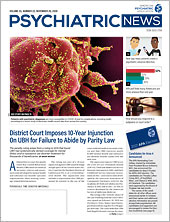When Americans experience a psychiatric emergency, they frequently have only two options, said Matthew Goldman, M.D., M.S.: the emergency room or jail.
“For people who are in psychiatric crises, it’s very hard to know where to go,” said Goldman, a member of APA’s Council on Advocacy and Government Relations and associate medical director of San Francisco’s Department of Public Health’s Comprehensive Crisis Services.
Legislation has been introduced in both the House (HR 7159) and Senate (S 4282) to allow states to bolster their crisis care programs and services. The Crisis Care and Suicide Prevention Act of 2020 would direct states to use 5% of their Mental Health Block Grant for crisis care services, including crisis call centers, mobile crisis services, or crisis stabilization programs. The legislation was introduced this past summer by Reps. Cheri Bustos (D-Ill.) and Susan Wild (D-Pa.) and Sens. Joe Manchin (D-W.Va.) and Cory Gardner (R-Colo.). APA strongly supports the legislation.
“Too many individuals who experience a severe mental health crisis find themselves either in costly emergency rooms waiting hours or days for appropriate care or in jail,” said APA CEO and Medical Director Saul Levin, M.D., M.P.A., in a news release. The bills, he continued, “will help our states and local communities create evidence-based interventions so those experiencing a crisis related to mental health or substance use can quickly receive needed care and avoid unnecessary encounters with the criminal justice system.”
The Mental Health Block Grant is administered by the Substance Abuse and Mental Health Services Administration (SAMHSA). The bills are contingent on Congress increasing the overall Mental Health Block Grant by 5%, or $35 million, to ensure that existing programs receiving grant funding are not adversely impacted, according to a Manchin fact sheet on the legislation.
At Bustos’s initiative, the House of Representatives included in its appropriations bill $35 million that APA had requested for the Fiscal 2020 budget, but the funding did not make it into the final budget agreement that was negotiated with the Senate. For Fiscal 2021, the Trump administration included a $35 million increase in its proposed budget for the Mental Health Block Grant to support states’ efforts to build crisis systems, and the House proposed the funding in its Labor-Health and Human Services appropriations bill. The bipartisan interest in enhancing crisis services is clear, but the question now is whether Congress will include the funding in a final funding package. At the end of September, Congress passed a continuing resolution that funds federal programs until December 11, delaying a final decision until then.
The Crisis Care Improvement and Suicide Prevention Act of 2020 is a crucial first step in ensuring that crisis care services across the country receive adequate support and funding, Goldman said.
Upon receiving the funding, he said, policymakers in each state will have resources to examine their own crisis service system. “They’ll have to ask, ‘How are we actually delivering crisis services? Does our model fit the SAMHSA best practices toolkit?’ ” he said. “This will establish crisis services as a key component of every state’s mental health portfolio.”
SAMHSA’s National Guidelines for Behavioral Health Crisis Care Best Practice Toolkit was released earlier this year and outlines how to estimate each community’s crisis care needs. “While an individual crisis cannot be fully predicted, we can plan how we structure services and organize approaches to best meet the needs of those individuals who experience a mental health crisis,” the toolkit’s introduction states. “Too often that experience is met with delay, detainment, and even denial of service in a manner that creates undue burden on the person, law enforcement, emergency departments, and justice systems.”
Though there has long been an urgency around expanding crisis care capacity, the COVID-19 pandemic only increases that urgency, Goldman said. Studies have shown an increase in stress, anxiety, and depression among Americans (see story on page 7), which will likely increase the demand for mental health services. A coordinated crisis care system can play a very important role as an access point for those services, he explained.
According to the Washington Post’s regularly updated database, as of press time 23% of the 5,680 people who have been fatally shot by a police officer in the line of duty since January 1, 2015, had a mental illness. In the past year, there have been multiple reports of people calling police when a family member was experiencing a mental health crisis, only for the encounter to end tragically.
Psychiatrists, Goldman noted, play an essential role in the development of crisis care services. Often, the main crisis care workforce includes social workers or trained therapists. “But the strong clinical expertise offered by psychiatrists is essential to help with the design and implementation of what I think of as clinical pathways to appropriate care, such as clear differential diagnoses, risk assessment, triage, and appropriate referral.” ■
“New Opportunities to Improve Mental Health Crisis Systems” is posted
here.
“National Guidelines for Behavioral Health Crisis Care: Best Practice Toolkit” is posted
here.

